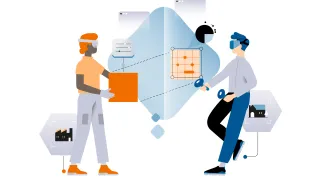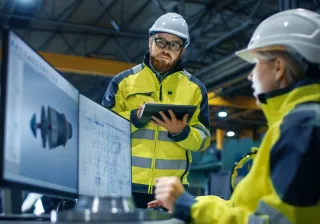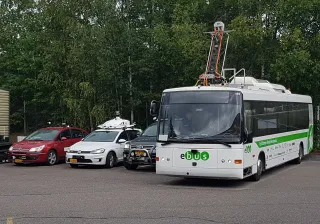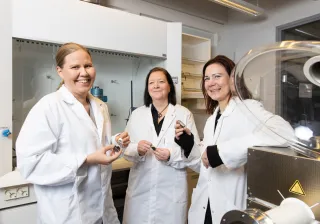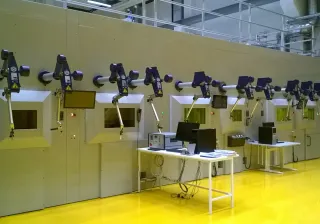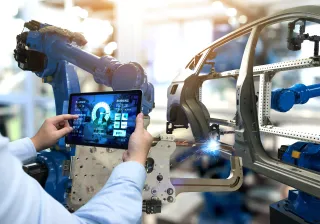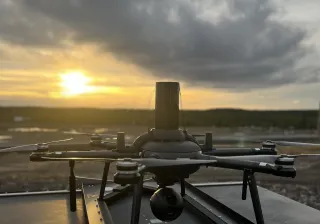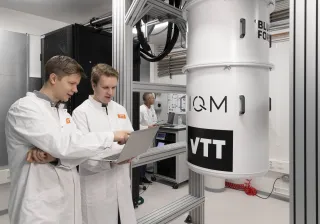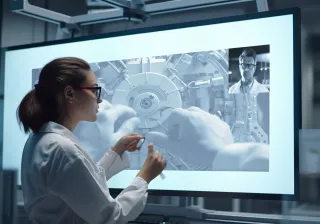In the near future, industrial workers will be able to handle several jobs during a single maintenance visit, thanks to new possibilities such as AR-powered real-time assistance from remote experts. Digital models will enable the worker to see precisely what needs to be done and to view key data such as the availability of spare parts. In the event of something unexpected, the worker can discuss different solutions with an AI assistant. At the same time, the different devices used will collect data on the work task and surrounding environment – data which can then be used for work planning. All of this will take place flexibly and comfortably via an accessible user interface.
Future work scenarios like the one above are being sketched out in a project exploring the metaverse’s future impact on industrial work. Of particular interest are field workers, whose work has not been changed by the coronavirus pandemic in the same way as that of knowledge workers. Such labour-intensive sectors include manufacturing, maintenance, construction and logistics. Participating in this VTT-led project were the following companies: Valmet Automotive, KONE, Finavia, YIT, Granlund, Telia, ZOAN, Sulava, Dazzle and Nordkapp.
The metaverse doesn't mean that everyone will work wearing smart glasses in the future. It is part of a much larger transformation of the next-generation internet that extends to organizational models and smart contracts. The possibilities of the metaverse should be looked at from three different levels: individual employees, teams, and organizations.
“One of the most interesting emerging topics is decentralised autonomous organisations (DAOs). Through the metaverse, employees could offer their expertise flexibly to several different companies. Companies, in turn, could use remote experts through their own metaverse to efficiently perform individual tasks or work as part of a larger virtual team,” explains VTT’s Smart Manufacturing Lead Karoliina Salminen.
Different forms of hybrid work will become prominent in both independent and team-based tasks. Work can be done remotely in a virtual working environment and shared virtual workspace or alternatively in a real working environment which also harnesses VR-based data, expertise and tools. The wide potential of AI was made clear to all at the latest through ChatGPT. An efficient and context-dependent flow of cooperation and seamless communication between employees, robots and AI are the key to future work.
“At KONE, we have already successfully piloted various industrial metaverse tools. For example, we have trained lift installers within virtual environments and provided real-time assistance to maintenance personnel using AR and remote experts. Our goal in this is both to facilitate the work of our personnel and to continually identify new ways to serve our customers even better,” says KONE’s Head of Concepting Mika Kemppainen.
“Some interesting areas of application within YIT’s business environment would be work orientation, work guidance, and the use of extended reality (XR) solutions such as remote monitoring and remote-controlled inspections and surveillance. Within the metaverse environment, we could examine with greater clarity and detail the impacts of different design solutions before their actual implementation. This could also bring a potential boost in marketing and sales, as the creation of digital twins for homes and other properties enables customers to explore them within a very life-like environment,” explains Chief Technology Architect Janne Torppa from YIT.
Through this project, it has become even clearer that industrial work is undergoing transformation and companies are ready to change the way they operate. It has also confirmed our assumption that there are many common factors in the work carried out in different industrial sectors. Such cross-sectoral challenges can thus be turned into opportunities for solution providers to offer their services to a wider market.
Although the direction is clear, there are still open questions. Some of the key areas for the joint research with industrial companies include: the cognitive strain of hybrid work; the role and significance of the work community; operating practices and rules; privacy, security, and data management; and other technical solutions such as integrations and data transfer.
“If people lose interest in industrial work, Finnish industry will face serious problems. Thankfully, Finnish companies are well placed both to ensure the vitality of Finnish industry and to provide global markets with technical solutions which enable transformation of work,” Salminen concludes.

Further information
Karoliina Salminen, Smart Manufacturing Lead, VTT, +358 (0)40 017 9311, [email protected]
Mika Kemppainen, Head of Concepting, Digital Services, KONE, [email protected]
Janne Torppa, Chief Technology Architect, YIT, [email protected]

